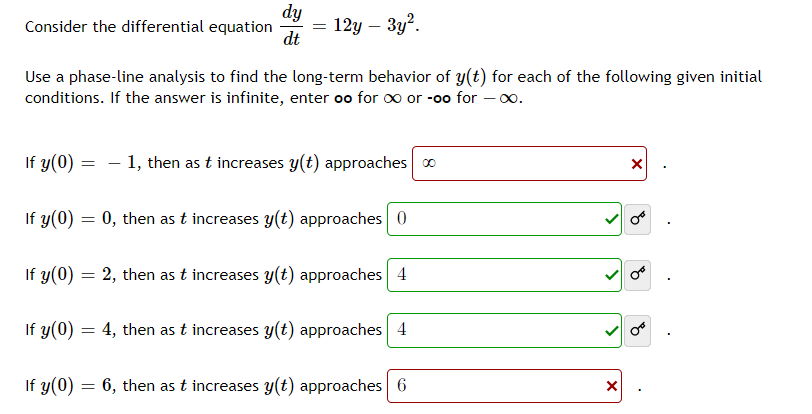dy = 12y – 3y?. Consider the differential equation dt Use a phase-line analysis to find the long-term behavior of y(t) for each of the following given initial conditions. If the answer is infinite, enter oo for oo or -o0 for – 00. If y(0) = - 1, then as t increases y(t) approaches o If y(0) = 0, then as t increases y(t) approaches 0 If y(0) = 2, then as t increases y(t) approaches 4 If y(0) = 4, then as t increases y(t) approaches 4 %3D If y(0) = 6, then as t increases y(t) approaches 6
dy = 12y – 3y?. Consider the differential equation dt Use a phase-line analysis to find the long-term behavior of y(t) for each of the following given initial conditions. If the answer is infinite, enter oo for oo or -o0 for – 00. If y(0) = - 1, then as t increases y(t) approaches o If y(0) = 0, then as t increases y(t) approaches 0 If y(0) = 2, then as t increases y(t) approaches 4 If y(0) = 4, then as t increases y(t) approaches 4 %3D If y(0) = 6, then as t increases y(t) approaches 6
Calculus: Early Transcendentals
8th Edition
ISBN:9781285741550
Author:James Stewart
Publisher:James Stewart
Chapter1: Functions And Models
Section: Chapter Questions
Problem 1RCC: (a) What is a function? What are its domain and range? (b) What is the graph of a function? (c) How...
Related questions
Question
Consider the differential equation dydt=12y−3y2.dydt=12y-3y2.
Use a phase-line analysis to find the long-term behavior of y(t)y(t) for each of the following given initial conditions. If the answer is infinite, enter oo for ∞∞ or -oo for −∞-∞.
If y(0)=−1y(0)=-1, then as tt increases y(t)y(t) approaches ∞Incorrect .
If y(0)=0y(0)=0, then as tt increases y(t)y(t) approaches 0Correct .
If y(0)=2y(0)=2, then as tt increases y(t)y(t) approaches 4Correct .
If y(0)=4y(0)=4, then as tt increases y(t)y(t) approaches 4Correct .
If y(0)=6y(0)=6, then as tt increases y(t)y(t) approaches 6Incorrect .

Transcribed Image Text:dy
= 12y – 3y?.
dt
Consider the differential equation
Use a phase-line analysis to find the long-term behavior of y(t) for each of the following given initial
conditions. If the answer is infinite, enter oo for o or -0o for – 00.
If y(0) = – 1, then as t increases y(t) approaches o
If y(0) = 0, then as t increases y(t) approaches 0
If y(0) = 2, then as t increases y(t) approaches 4
If y(0) = 4, then as t increases y(t) approaches 4
If y(0) = 6, then as t increases y(t) approaches 6
Expert Solution
This question has been solved!
Explore an expertly crafted, step-by-step solution for a thorough understanding of key concepts.
This is a popular solution!
Trending now
This is a popular solution!
Step by step
Solved in 3 steps with 1 images

Recommended textbooks for you

Calculus: Early Transcendentals
Calculus
ISBN:
9781285741550
Author:
James Stewart
Publisher:
Cengage Learning

Thomas' Calculus (14th Edition)
Calculus
ISBN:
9780134438986
Author:
Joel R. Hass, Christopher E. Heil, Maurice D. Weir
Publisher:
PEARSON

Calculus: Early Transcendentals (3rd Edition)
Calculus
ISBN:
9780134763644
Author:
William L. Briggs, Lyle Cochran, Bernard Gillett, Eric Schulz
Publisher:
PEARSON

Calculus: Early Transcendentals
Calculus
ISBN:
9781285741550
Author:
James Stewart
Publisher:
Cengage Learning

Thomas' Calculus (14th Edition)
Calculus
ISBN:
9780134438986
Author:
Joel R. Hass, Christopher E. Heil, Maurice D. Weir
Publisher:
PEARSON

Calculus: Early Transcendentals (3rd Edition)
Calculus
ISBN:
9780134763644
Author:
William L. Briggs, Lyle Cochran, Bernard Gillett, Eric Schulz
Publisher:
PEARSON

Calculus: Early Transcendentals
Calculus
ISBN:
9781319050740
Author:
Jon Rogawski, Colin Adams, Robert Franzosa
Publisher:
W. H. Freeman


Calculus: Early Transcendental Functions
Calculus
ISBN:
9781337552516
Author:
Ron Larson, Bruce H. Edwards
Publisher:
Cengage Learning